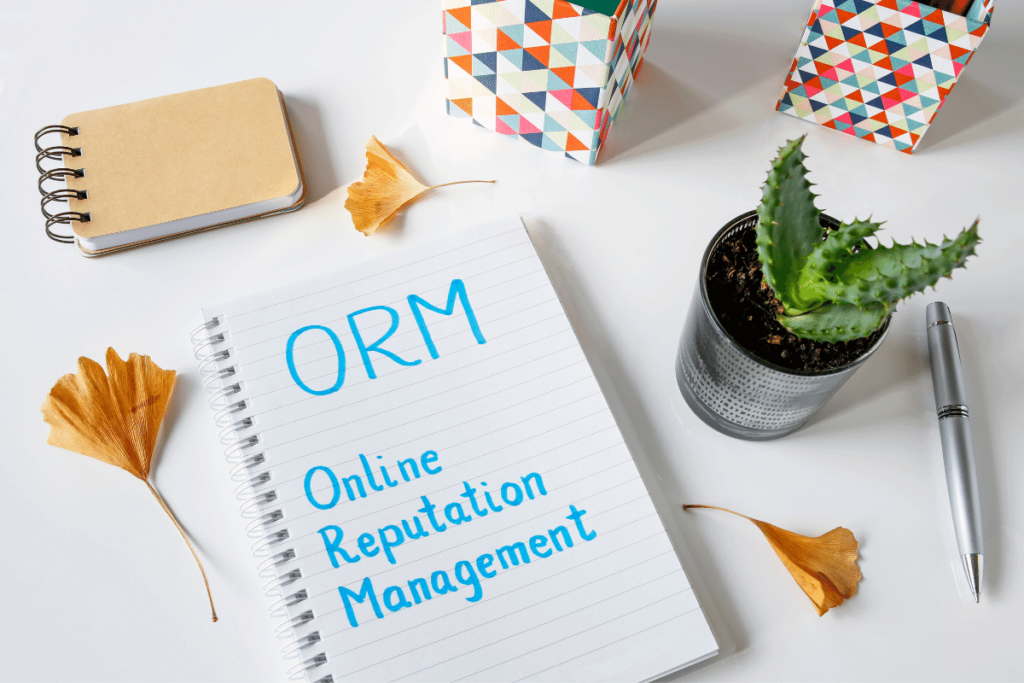- +91 7003096314
- business@kreativeunlock.com
Let’s imagine a scenario. Suppose you own a business. You work day in and day out to provide exceptional service and value to your customers. You have developed spaces like social media platforms to interact with old and new potential customers.
But things do not always go as planned. Even the best of brands and businesses face setbacks, on a regular basis. A negative review from an angry customer; or a viral yet misleading news-story, may tarnish the brand to extents beyond your expectations. The brand that you have struggled so hard to build, is on the verge of sinking.
What to do next? How do you get out of this storm? And, if you somehow manage to bounce back on your feet, what precautions and strategies should you take, to ensure something bad of this scale doesn’t happen?
This is the moment where Online Reputation Management (ORM) can be beneficial for you.
By actively managing your online presence and protecting the reputation of your business, you can do away with the negative reviews and angry feedback and maintain positivity and sustenance in your online space.
In this blog, you will have a walkthrough of what ORM is, why it is important and how you can get started with it; including a couple of strategies for your business.
What is meant by Online Reputation Management?
First, let’s bust some myths about ORM. Contrary to popular belief, it is beyond activities like Social Media Monitoring and developing good Public Relations(PR).

Most business owners fail to understand how much impact it holds on the sales figures.
Online Reputation of a company is basically how people see your brand, when they look it up online. ORM means, taking initiatives to ensure positivity in the interactions between company, customers and others. The various techniques and strategies are implemented so that people can find the right informative materials, coupled with favourable comments and feedbacks; when they browse through your online presence.
Why should you implement it?
Making sure how the brand is represented:
For most people, the Internet is the first source of information. Reputation of a brand can never be trusted with the algorithm of search engines; which fails to differentiate between a full-blown, judgemental media story and the truth. ORM helps build positive and truthful visibility of a brand.
Taking actions sooner:
In the rapidly growing online space , the importance of transparency between consumers and brands has become paramount. A negative feedback, a low star rating, an angry comment from an unhappy customer can add momentum quickly, if not addressed soon. ORM can respond to these issues properly and ensure none of these minor discontentments blows up enough to eventually tarnish the brand.
Developing a space for personalised interactions:
To help build any brand, it is imperative to provide the consumers with spaces where they can have organic and personalised interactions. Most consumers want the brand to respond to their queries in a personalised manner, via mentions in Social Media, or direct messages. A robust ORM strategy can be extremely beneficial in this regard.

How to get started with ORM?
7 Useful tips for effective Online Reputation Management
Initially the whole process of monitoring and managing your online presence might seem daunting. But don’t fret! We are here for you!
Here’s providing an introductory checklist for any brand, to get started with its ORM journey.
1. Extend your Online Presence - Take control of how others perceive your brand:
The ‘trifecta’ of social media networks include Twitter, Facebook, and Instagram. However, for businesses, there are hundreds of other social sites to consider as a method to broaden your digital footprint. The goal is to understand which channels your target consumer base predominantly uses in order to develop an online presence.
For example, B2B companies would benefit from having a LinkedIn profile, where they can make professional relationships with entrepreneurs who could profit from their services. B2C industries, on the other hand, may explore displaying their items on a visual platform such as Pinterest. Businesses that want to reach a younger market should keep an eye on upcoming social platforms like Snapchat, especially since these newer apps are not yet oversaturated with commercial accounts.
Extending your online presence will not only allow you to engage with your target audience, but it will also strengthen your control over the top search results for your business in the event of an unfavourable review.
2. Monitor and Increase Brand and Product Visibility:
To gain recognition of your brands, related products and services outside your company name, you may need expanding your web presence and social platforms. Develop websites, social media accounts, and other types of rankable material for your company’s many factions.
Monitoring efficiently:
Being proactive in monitoring online conversations offers you a real-time view of your online presence and allows you to respond quickly. However, it is not simply a matter of seeing how reviews rank on Google. You may set up a campaign to monitor the web for mentions of your brand, products, and people, ensuring that you are always aware of what others are saying about you.
3.Generating Online Reviews and Responding to Them:

Allowing your satisfied clients and consumers to improve your business’s internet reputation is one of the most effective ways to do it. According to the 2018 Local Consumer Review Survey, a whopping 86 percent of customers research online about a certain product and consult internet reviews before making a purchase.
With this in mind, soliciting reviews from your customers on Google My Business, Facebook, and/or Yelp will assist your business in establishing a positive reputation and fostering consumer confidence and trust.
Along with gathering consumer reviews, ORM is also dependent on how your company responds to any negative review. Rather than ignoring unsatisfactory reviews and angry comments – or worse, becoming argumentative; you must sound apologetic for their experience and reach out to them via phone call or email to work out a solution.
Often, the reviewer will agree to update their initial review with a higher star rating if the issues have been addressed and a resolution reached in a professional and amicable manner.
4. Always Pay Attention to Your Customers - Taking Responsibility:
When reacting to unfavourable customer feedback, it’s critical to keep in mind that the criticisms may have some value. This is especially true if you frequently receive negative feedback about a certain issue. Ensure that you answer all concerns professionally while evaluating how this input may be used to enhance your business operations in the future.
Taking responsibility for mistakes: If your business is facing a huge backlash for a genuine or perceived scandal, it never hurts to apologise unconditionally.
Demonstrating regret helps to defuse heated customer situations and develops consumer relationships. Additionally, it demonstrates to buyers that your business is trustworthy and truthful.
Create your apology with the sincere aim of acknowledging and resolving the situation. Take responsibility and address directly the primary issues made by consumers and the media, and detail your strategy for resolving the situation.
Consider the means by which you will deliver your apologies as well. For example, if the majority of unfavourable input is received via social media, that would be the proper method for posting your statement.
5. Use SEO effectively - Stay on top of Search Results:
The majority of marketers view SEO as a means of ensuring their brand remains visible. However, it is a critical tool for decreasing the visibility of unfavourable publicity and material about your business.
In an ideal world, your company’s page would be the first to appear when your company’s name is searched. After all, the first result on the Search Engine Results Page (SERP) receives over 31% of all clicks, and customers are ten times more likely to click on the first search result than on a page ten spaces down.
Another strategy to boost search results is to encourage satisfied consumers to leave positive feedback on review sites that rank products. This increases your average rating, which is displayed to potential consumers prior to clicking in to view individual reviews.

6. Produce Brand related Content Frequently:
Another aspect of online reputation management that should be mentioned is branding. We don’t only mean the visual aesthetics, while they are crucial, but also the overall consistency of messaging and tone of voice.
The material that your customers come across when searching for your brand will heavily influence their view of it. So, by implementing a robust ORM strategy, you have the ability to present yourself in the way you want to be perceived.
Keep Your Blog Up to Date:
Blogging is a key component of developing brand content. It is beneficial to ORM for a variety of reasons. To begin with, blogging on a regular basis allows you to establish expertise and thought leadership in your sector. Your blog also allows you to build a loyal following by providing your readers with solutions to frequently asked concerns about your niche. As an added advantage, blogging improves local SEO rankings and generates content to share on social media sites.
Interested in blogging? You can learn more about the importance of blogging in business here.
7. Invest in Online Reputation Management:
Establishing your online reputation necessitates a commitment of both time and money. Regrettably, many small businesses fail to manage their image proactively until there is a problem that needs to be handled.
Proactive ORM is a critical component of any modern digital marketing plan. If you lack the expertise required to manage your company’s reputation, doing it on your own may be stressful, time-consuming, and/or potentially alienating to your consumers. A well-managed internet reputation is always worth the investment – if you don’t have the time, don’t know where to begin, or simply aren’t receiving the desired results; employ someone to handle it for you.
Automate ORM :
Instead of manually trawling through websites and social media, use software that automates ORM activities to save time. There are numerous solutions available online to assist you in developing your ORM tasks properly. With these automated tools, you’ll have more time to focus on the more important tasks, such as addressing issues and strengthening connections with dissatisfied customers.
Summing up:
It is critical to be ready for the worst: If you or your company receives online criticism, there are a number of tactics that can be used to repair the damage.
Adhering to these suggestions for strengthening your online reputation management approach can place your company in a better position.
Local brands are far more vulnerable to internet reputation attacks since they lack the major corporations’ substantial finances and knowledge.
Being proactive about online reputation management is the greatest approach to defend oneself from both unfavourable statements and the financial damage that often results from them.

It is never too early to begin developing an ORM strategy for your company.
Want to know more? Chat with our team or simply drop an email to learn what your company is already doing well and poorly, as well as where you can introspect further to boost your online reputation.
